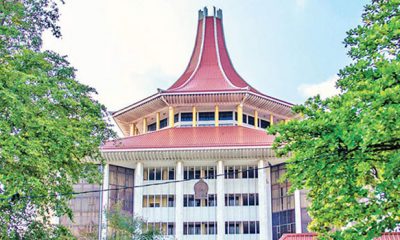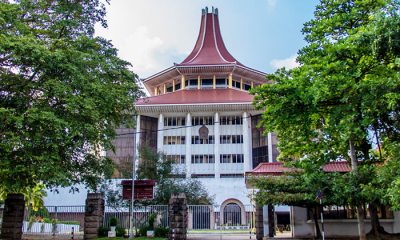Features
Dissenting judgement on MR, GR, BR, PB & Cabraal

by. C. A. Chandraprema
The manner in which Justice Priyantha Jayawardena’s dissenting judgement on the two fundamental rights cases numbered 195/2022 and 212/2022 was reported on by sections of the media would convey the impression that it was based entirely on the technical point that the petitioners had not come before the SC within the time frame specified by the Constitution. Justice Jayawardena’s dissenting judgement does state that: “I hold that the parties have not invoked the jurisdiction of this court within one month of the alleged infringements as required by Article 126(2) of the Constitution”. However, that is not the only reason for him to dissent. His dissenting judgement also states, “I am of the view that the petitioners have not established on a balance of probability that the respondents have infringed the Fundamental Rights of the petitioners.”
One of the ways in which the dissenting judgement shows that the petitioners had not approached the SC within the time frame stipulated in the Constitution can be summarised as follows:
* The SC/FR Application No. 195/2022 was filed in the Supreme Court on the 3rd of June, 2022 and SC/FR Application No. 212/2022 was filed on the 17th of June, 2022.
* The reduction in taxes was based on a Cabinet Paper dated 26 November, 2019.
* According to the petitioners, the rating agencies downgraded Sri Lanka immediately after the tax cuts were announced. Hence, according to the petitioner’s own showing, the alleged infringement took place on the day that the Commissioner General of the Inland Revenue published the public notices informing the tax cuts in the years 2019 and 2020.
* Furthermore, the tax reductions referred to in the two petitions were enacted into law in terms of the Inland Revenue Act of 2021, the Value Added Tax Act of 2021, the Economic Service Charge Act of 2021 and the Nation Building Tax Act of 2021, etc.
* Some of these Bills relating to fiscal legislation were challenged in the Supreme Court. However, the petitioners did not challenge any of the said legislation during the legislative process. Hence, they are now estopped from challenging the legislative process. In any event, anyone who sleeps over their rights is not entitled to challenge any decisions after the stipulated time period imposed by law.
* The dates and events referred to above in this judgment show that the said events took place long before the two Fundamental Rights Applications were filed in court.
Quoting the Auditor General’s Report which had drawn attention to a presentation made by Prof. W D Lakshman on 06 January 2020, the judgement observed that the “…tax relief measures are expected to stimulate the economy while actively contributing to improve business confidence …” A segment in the judgement titled Fiscal Policy elaborated as follows:
“Tax cuts are expected to free up disposable income and the circulation of money in the economy and push positive growth values in the medium and long term. Furthermore, reducing taxes improves the economy by boosting spending. Moreover, a corporate income tax cut leads to a sustained increase in Gross Domestic Product (GDP) and productivity. Tax cuts also increase funding available for businesses and may increase production and investment. Moreover, high taxes discourage work and investment. Taxes create a “wedge” between what the employer pays and what the employee receives, so some jobs are not created. High marginal tax rates also discourage people from working overtime or from making new investments. However, tax cuts reduce government revenue and lead to budget deficits or growth in government debt … In his first address to the Congress on the 28th of February, 2001, George W. Bush said, “To create economic growth and opportunity, we must put money back into the hands of the people who buy goods and create jobs.”
Going to the IMF
With regard to the question of going to the IMF to seek a bailout package, the dissenting judgement observed that the decision not to go to the IMF had been communicated to the Parliament on the 10th of December, 2021 by the then finance minister and that the Cabinet of Ministers had decided on 3 January, 2022, not to get the assistance of the IMF and to have a homegrown solution to the fiscal and economic issues that were faced by the country at the time. A Cabinet Memorandum dated 2 January, 2022 had observed that “It would not be incorrect to state that an IMF programme will require the country to accept conditions that will further disrupt the social fabric of the country. While it is acknowledged that an IMF programme will enable the country to access the capital markets with better ease, it is our experience that none of the IMF programmes since the late 60s, have resulted in any lasting reforms being implemented in the country.”
The dissenting judgement observed that “The IMF assists member nations in different capacities. Its most important function is the ability to provide loans to member nations in need of bailouts. Further, if a country has a deficit in its balance of payments, the IMF can step in to fill the gap. However, borrowing governments must adhere to the conditions attached to these loans by the IMF, including prescribing economic and fiscal policies … Moreover, such conditions may cause severe hardships to the general public of the country that seeks assistance from the IMF. Hence, some countries are reluctant to seek the assistance of the IMF. Furthermore, there are instances where countries seek the assistance of the IMF as a last resort and may give up the IMF programmes without completing them due to their inability to comply with the stringent conditions imposed by the IMF. In fact, on several occasions, Sri Lanka has discontinued IMF programmes due to its inability to comply with the conditions laid down by the IMF….”
“In the circumstances, I am of the view that the petitioners have not established that the policy decision of the government not to go to the IMF was grossly arbitrary or irrational. On the contrary, the Auditor General’s Report tendered to court, and the material filed by the respondents, particularly the aforementioned Cabinet Memoranda and the decisions of the Cabinet of Ministers, show that the government has considered the pros and cons of going to the IMF, the past experiences with the IMF, the effects of obtaining assistance from the IMF will have on the economy and the people, and thereafter taken the policy decision not to go to the IMF.”
Matters of govt. policy
The dissenting judgement has taken into account the report of the Auditor General, where the latter is quoted in Sinhala as having stated that the three issues on which the SC had ordered the Auditor General to report back on, pertained to policy decisions of the government and that different parties may give varying interpretations as to the favourable or unfavourable consequences of a policy decision. The Auditor General has also observed that any assessment of the consequences of those decisions will have to take into account the situation created by the Covid pandemic which affected not only Sri Lanka but the entire world. He has further stated that he is not in a position to determine the best way in which limited foreign reserves should be used in a given set of circumstances. The dissenting judgement further observed:
“… the Auditor General … has evaluated the three issues on which he was directed to report to this court. In his report, he has stated that it is not possible to determine whether a loss had been caused to the Central Bank. Further, he has not specified any violations with regard to any of the matters that were referred to him by the court …. However, though the said report stated there are delays in taking decisions by the Monetary Board and the government, it does not set out any specific violations of the law by the respondents. Hence, I am of the view that there is no expert evidence before this court to decide on the economic and fiscal issues raised in the said two applications.”
The dissenting judgement observed that when it comes to policy matters, “the court would leave policy matters for those who are qualified to address the issues, unless the policy or action is inconsistent with the Constitution and laws, grossly arbitrary or irrational … Furthermore, the courts cannot express their opinion as to whether, at a particular point in time or in a particular situation, any such policy should have been introduced or not, or repealed, particularly when a policy is accepted by Parliament either at reading of the budget or in any other instances. Hence, it should be left to the discretion of the government …”
“Moreover, complex executive decisions in economic matters may be empirical or based on experimentation. Its validity cannot be tested on rigid principles or the application of any straitjacket formula. In such matters, even experts may seriously or doubtlessly differ. Courts cannot be expected to decide them, even with the aid of experts. Thus, the courts do not interfere with policy matters or economic decisions, as such matters are highly technical and even experts in that field hold different opinions on the same point.”
The debt trap
The dissenting judgement quotes a Cabinet Memorandum dated 2 January, 2022 under the heading “Economy 2022 and the way forward” which stated the following:
“In fact, it would be pertinent to note that the economic challenges of today are due to two key decisions of the Yahapalana government, which are;
“The aggressive borrowing in the International Bond markets resulted in the country borrowing USD 12 billion dollars during 2015-2019 with USD 6.9 billion being borrowed during a 14 months period of April 2018 to May 2019. As a result, the country’s foreign currency debt stock reached almost 50% of the total debt stock at the end of 2019 with the stock of ISB’s at wound USD 15 billion. This has now reduced to USD 13 billion”.
“Reduction in the price of Petrol and Diesel in 2015, without any thought to recouping the losses of Ceylon Petroleum Corporation (CPC) or the Ceylon Electricity Board (CEB) or to the possibility of an increase in global oil prices”.
“It is noted that of the USD 12 billion so raised only around USD 2 billion had been utilized to settle ISBs, while the bulk seems to have been utilized to finance the imports, especially cars and other passenger vehicles. In fact, consumption of fuel which had decreased by the end 2014 has increased surpassing the previous consumption volumes although economic growth saw a steady decline”.
Impact of the pandemic
The dissenting judgement also draws attention to the Auditor General’s Report furnished to court which had stated: “The Executive Board of the International Monetary Fund (IMF) concluded the Article IV consultation with Sri Lanka on 25 February 2022. The press release No. 22/54 in this regard had been issued on 02 March 2022. Highlights of the press release are as follows. Sri Lanka has been hit hard by COVID-19. On the eve of the pandemic, the country was highly vulnerable to external shocks owing to inadequate external buffers and high risks to public debt sustainability, exacerbated by the Easter Sunday terrorist attacks in 2019 and major policy changes including large tax cuts at late 2019. Real GDP contracted by 3.6 percent in 2020, due to a loss of tourism receipts and necessary lockdown measures. Sri Lanka lost access to international sovereign bond market at the onset of the pandemic”.
The dissenting judgement further observed that: “Moreover, it is pertinent to note that the effects of COVID-19 were similar or more adverse to the effects that were caused during the ‘Great Depression’ economic crisis in 1929. It adversely affected our export income, which brought forex to the country. Similarly, the said pandemic reduced foreign employment opportunities and thereby adversely affected one of Sri Lanka’s main foreign earnings”.
“In fact, the effects of the Easter Sunday bombings and the adverse effects of COVID-19, particularly, the unexpectedly large expenditure incurred for island-wide vaccination programmes and quarantine centres, long periods of lockdowns, island-wide curfews, political uncertainty and rivalry, public protests against implementing the economic policies of the government, specifically with regard to privatisation, litigation challenging the privatisation of State entities and geopolitical issues, disturbed the implementation of the policies of the government. Further, such matters adversely affected the income from tourism and witnessed the withdrawal of overseas and local investors from Sri Lanka. Hence, all such unexpected intervening factors immensely contributed to the economic and financial collapse in Sri Lanka”.
“The IMF country reports and the Cabinet Memorandums filed in court show that the fiscal and economic issues that arose in the year 2022 were partly as a result of accumulated debts that have taken place for several decades. Thus, it is not ‘just and equitable’ to hold the respondents responsible for violations of Fundamental Rights only by considering limited materials filed in court for the period commencing from 2019”.
Features
Rethinking post-disaster urban planning: Lessons from Peradeniya
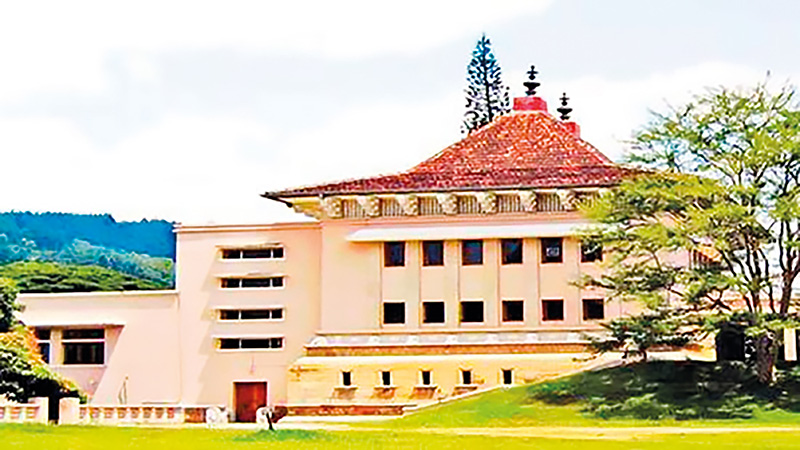
A recent discussion by former Environment Minister, Eng. Patali Champika Ranawaka on the Derana 360 programme has reignited an important national conversation on how Sri Lanka plans, builds and rebuilds in the face of recurring disasters.
His observations, delivered with characteristic clarity and logic, went beyond the immediate causes of recent calamities and focused sharply on long-term solutions—particularly the urgent need for smarter land use and vertical housing development.
Ranawaka’s proposal to introduce multistoried housing schemes in the Gannoruwa area, as a way of reducing pressure on environmentally sensitive and disaster-prone zones, resonated strongly with urban planners and environmentalists alike.
It also echoed ideas that have been quietly discussed within academic and conservation circles for years but rarely translated into policy.
One such voice is that of Professor Siril Wijesundara, Research Professor at the National Institute of Fundamental Studies (NIFS) and former Director General of the Royal Botanic Gardens, Peradeniya, who believes that disasters are often “less acts of nature and more outcomes of poor planning.”
“What we repeatedly see in Sri Lanka is not merely natural disasters, but planning failures,” Professor Wijesundara told The Island.
“Floods, landslides and environmental degradation are intensified because we continue to build horizontally, encroaching on wetlands, forest margins and river reservations, instead of thinking vertically and strategically.”
The former Director General notes that the University of Peradeniya itself offers a compelling case study of both the problem and the solution. The main campus, already densely built and ecologically sensitive, continues to absorb new faculties, hostels and administrative buildings, placing immense pressure on green spaces and drainage systems.
“The Peradeniya campus was designed with landscape harmony in mind,” he said. “But over time, ad-hoc construction has compromised that vision. If development continues in the same manner, the campus will lose not only its aesthetic value but also its ecological resilience.”
Professor Wijesundara supports the idea of reorganising the Rajawatte area—located away from the congested core of the university—as a future development zone. Rather than expanding inward and fragmenting remaining open spaces, he argues that Rajawatte can be planned as a well-designed extension, integrating academic, residential and service infrastructure in a controlled manner.
Crucially, he stresses that such reorganisation must go hand in hand with social responsibility, particularly towards minor staff currently living in the Rajawatte area.
“These workers are the backbone of the university. Any development plan must ensure their dignity and wellbeing,” he said. “Providing them with modern, safe and affordable multistoried housing—especially near the railway line close to the old USO premises—would be both humane and practical.”
According to Professor Wijesundara, housing complexes built near existing transport corridors would reduce daily commuting stress, minimise traffic within the campus, and free up valuable land for planned academic use.
More importantly, vertical housing would significantly reduce the university’s physical footprint.
Drawing parallels with Ranawaka’s Gannoruwa proposal, he emphasised that vertical development is no longer optional for Sri Lanka.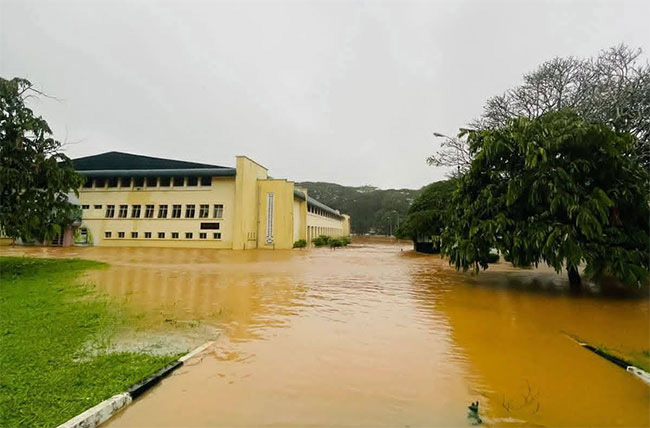
“We are a small island with a growing population and shrinking safe land,” he warned.
“If we continue to spread out instead of building up, disasters will become more frequent and more deadly. Vertical housing, when done properly, is environmentally sound, economically efficient and socially just.”
The veteran botanist also highlighted the often-ignored link between disaster vulnerability and the destruction of green buffers.
“Every time we clear a lowland, a wetland or a forest patch for construction, we remove nature’s shock absorbers,” he said.
“The Royal Botanic Gardens has survived floods for over a century precisely because surrounding landscapes once absorbed excess water. Urban planning must learn from such ecological wisdom.”
Professor Wijesundara believes that universities, as centres of knowledge, should lead by example.
“If an institution like Peradeniya cannot demonstrate sustainable planning, how can we expect cities to do so?” he asked. “This is an opportunity to show that development and conservation are not enemies, but partners.”
As climate-induced disasters intensify across the country, voices like his—and proposals such as those articulated by Patali Champika Ranawaka—underscore a simple but urgent truth: Sri Lanka’s future safety depends not only on disaster response, but on how and where we build today.
The challenge now lies with policymakers and planners to move beyond television studio discussions and academic warnings, and translate these ideas into concrete, people-centred action.
By Ifham Nizam ✍️
Features
Superstition – Major barrier to learning and social advancement

At the initial stage of my six-year involvement in uplifting society through skill-based initiatives, particularly by promoting handicraft work and teaching students to think creatively and independently, my efforts were partially jeopardized by deep-rooted superstition and resistance to rational learning.
Superstitions exerted a deeply adverse impact by encouraging unquestioned belief, fear, and blind conformity instead of reasoning and evidence-based understanding. In society, superstition often sustains harmful practices, social discrimination, exploitation by self-styled godmen, and resistance to scientific or social reforms, thereby weakening rational decision-making and slowing progress. When such beliefs penetrate the educational environment, students gradually lose the habit of asking “why” and “how,” accepting explanations based on fate, omens, or divine intervention rather than observation and logic.
Initially, learners became hesitant to challenge me despite my wrong interpretation of any law, less capable of evaluating information critically, and more vulnerable to misinformation and pseudoscience. As a result, genuine efforts towards social upliftment were obstructed, and the transformative power of education, which could empower individuals economically and intellectually, was weakened by fear-driven beliefs that stood in direct opposition to progress and rational thought. In many communities, illnesses are still attributed to evil spirits or curses rather than treated as medical conditions. I have witnessed educated people postponing important decisions, marriages, journeys, even hospital admissions, because an astrologer predicted an “inauspicious” time, showing how fear governs rational minds.
While teaching students science and mathematics, I have clearly observed how superstition acts as a hidden barrier to learning, critical thinking, and intellectual confidence. Many students come to the classroom already conditioned to believe that success or failure depends on luck, planetary positions, or divine favour rather than effort, practice, and understanding, which directly contradicts the scientific spirit. I have seen students hesitate to perform experiments or solve numerical problems on certain “inauspicious” days.
In mathematics, some students label themselves as “weak by birth”, which creates fear and anxiety even before attempting a problem, turning a subject of logic into a source of emotional stress. In science classes, explanations based on natural laws sometimes clash with supernatural beliefs, and students struggle to accept evidence because it challenges what they were taught at home or in society. This conflict confuses young minds and prevents them from fully trusting experimentation, data, and proof.
Worse still, superstition nurtures dependency; students wait for miracles instead of practising problem-solving, revision, and conceptual clarity. Over time, this mindset damages curiosity, reduces confidence, and limits innovation, making science and mathematics appear difficult, frightening, or irrelevant. Many science teachers themselves do not sufficiently emphasise the need to question or ignore such irrational beliefs and often remain limited to textbook facts and exam-oriented learning, leaving little space to challenge superstition directly. When teachers avoid discussing superstition, they unintentionally reinforce the idea that scientific reasoning and superstitious beliefs can coexist.
To overcome superstition and effectively impose critical thinking among students, I have inculcated the process to create a classroom culture where questioning was encouraged and fear of being “wrong” was removed. Students were taught how to think, not what to think, by consistently using the scientific method—observation, hypothesis, experimentation, evidence, and conclusion—in both science and mathematics lessons. I have deliberately challenged superstitious beliefs through simple demonstrations and hands-on experiments that allow students to see cause-and-effect relationships for themselves, helping them replace belief with proof.
Many so-called “tantrik shows” that appear supernatural can be clearly explained and exposed through basic scientific principles, making them powerful tools to fight superstition among students. For example, acts where a tantrik places a hand or tongue briefly in fire without injury rely on short contact time, moisture on the skin, or low heat transfer from alcohol-based flames rather than divine power.
“Miracles” like ash or oil repeatedly appearing from hands or idols involve concealment or simple physical and chemical tricks. When these tricks are demonstrated openly in classrooms or science programmes and followed by clear scientific explanations, students quickly realise how easily perception can be deceived and why evidence, experimentation, and critical questioning are far more reliable than blind belief.
Linking concepts to daily life, such as explaining probability to counter ideas of luck, or biology to explain illness instead of supernatural causes, makes rational explanations relatable and convincing.
Another unique example that I faced in my life is presented here. About 10 years ago, when I entered my new house but did not organise traditional rituals that many consider essential for peace and prosperity as my relatives believed that without them prosperity would be blocked. Later on, I could not utilise the entire space of my newly purchased house for earning money, largely because I chose not to perform certain rituals.
While this decision may have limited my financial gains to some extent, I do not consider it a failure in the true sense. I feel deeply satisfied that my son and daughter have received proper education and are now well settled in their employment, which, to me, is a far greater achievement than any ritual-driven expectation of wealth. My belief has always been that a house should not merely be a source of income or superstition-bound anxiety, but a space with social purpose.
Instead of rituals, I strongly feel that the unused portion of my house should be devoted to running tutorials for poor and underprivileged students, where knowledge, critical thinking, and self-reliance can be nurtured. This conviction gives me inner peace and reinforces my faith that education and service to society are more meaningful measures of success than material profit alone.
Though I have succeeded to some extent, this success has not been complete due to the persistent influence of superstition.
by Dr Debapriya Mukherjee
Former Senior Scientist
Central Pollution Control Board, India ✍️
Features
Race hate and the need to re-visit the ‘Clash of Civilizations’

 Australian Prime Minister Anthony Albanese has done very well to speak-up against and outlaw race hate in the immediate aftermath of the recent cold-blooded gunning down of several civilians on Australia’s Bondi Beach. The perpetrators of the violence are believed to be ardent practitioners of religious and race hate and it is commendable that the Australian authorities have lost no time in clearly and unambiguously stating their opposition to the dastardly crimes in question.
Australian Prime Minister Anthony Albanese has done very well to speak-up against and outlaw race hate in the immediate aftermath of the recent cold-blooded gunning down of several civilians on Australia’s Bondi Beach. The perpetrators of the violence are believed to be ardent practitioners of religious and race hate and it is commendable that the Australian authorities have lost no time in clearly and unambiguously stating their opposition to the dastardly crimes in question.
The Australian Prime Minister is on record as stating in this connection: ‘ New laws will target those who spread hate, division and radicalization. The Home Affairs Minister will also be given new powers to cancel or refuse visas for those who spread hate and a new taskforce will be set up to ensure the education system prevents, tackles and properly responds to antisemitism.’
It is this promptness and single-mindedness to defeat race hate and other forms identity-based animosities that are expected of democratic governments in particular world wide. For example, is Sri Lanka’s NPP government willing to follow the Australian example? To put the record straight, no past governments of Sri Lanka initiated concrete measures to stamp out the evil of race hate as well but the present Sri Lankan government which has pledged to end ethnic animosities needs to think and act vastly differently. Democratic and progressive opinion in Sri Lanka is waiting expectantly for the NPP government’ s positive response; ideally based on the Australian precedent to end race hate.
Meanwhile, it is apt to remember that inasmuch as those forces of terrorism that target white communities world wide need to be put down their counterpart forces among extremist whites need to be defeated as well. There could be no double standards on this divisive question of quashing race and religious hate, among democratic governments.
The question is invariably bound up with the matter of expeditiously and swiftly advancing democratic development in divided societies. To the extent to which a body politic is genuinely democratized, to the same degree would identity based animosities be effectively managed and even resolved once and for all. To the extent to which a society is deprived of democratic governance, correctly understood, to the same extent would it experience unmanageable identity-bred violence.
This has been Sri Lanka’s situation and generally it could be stated that it is to the degree to which Sri Lankan citizens are genuinely constitutionally empowered that the issue of race hate in their midst would prove manageable. Accordingly, democratic development is the pressing need.
While the dramatic blood-letting on Bondi Beach ought to have driven home to observers and commentators of world politics that the international community is yet to make any concrete progress in the direction of laying the basis for an end to identity-based extremism, the event should also impress on all concerned quarters that continued failure to address the matters at hand could prove fatal. The fact of the matter is that identity-based extremism is very much alive and well and that it could strike devastatingly at a time and place of its choosing.
It is yet premature for the commentator to agree with US political scientist Samuel P. Huntingdon that a ‘Clash of Civilizations’ is upon the world but events such as the Bondi Beach terror and the continuing abduction of scores of school girls by IS-related outfits, for instance, in Northern Africa are concrete evidence of the continuing pervasive presence of identity-based extremism in the global South.
As a matter of great interest it needs mentioning that the crumbling of the Cold War in the West in the early nineties of the last century and the explosive emergence of identity-based violence world wide around that time essentially impelled Huntingdon to propound the hypothesis that the world was seeing the emergence of a ‘Clash of Civilizations’. Basically, the latter phrase implied that the Cold War was replaced by a West versus militant religious fundamentalism division or polarity world wide. Instead of the USSR and its satellites, the West, led by the US, had to now do battle with religion and race-based militant extremism, particularly ‘Islamic fundamentalist violence’ .
Things, of course, came to a head in this regard when the 9/11 calamity centred in New York occurred. The event seemed to be startling proof that the world was indeed faced with a ‘Clash of Civilizations’ that was not easily resolvable. It was a case of ‘Islamic militant fundamentalism’ facing the great bulwark, so to speak, of ‘ Western Civilization’ epitomized by the US and leaving it almost helpless.
However, it was too early to write off the US’ capability to respond, although it did not do so by the best means. Instead, it replied with military interventions, for example, in Iraq and Afghanistan, which moves have only earned for the religious fundamentalists more and more recruits.
Yet, it is too early to speak in terms of a ‘Clash of Civilizations’. Such a phenomenon could be spoken of if only the entirety of the Islamic world took up arms against the West. Clearly, this is not so because the majority of the adherents of Islam are peaceably inclined and want to coexist harmoniously with the rest of the world.
However, it is not too late for the US to stop religious fundamentalism in its tracks. It, for instance, could implement concrete measures to end the blood-letting in the Middle East. Of the first importance is to end the suffering of the Palestinians by keeping a tight leash on the Israeli Right and by making good its boast of rebuilding the Gaza swiftly.
Besides, the US needs to make it a priority aim to foster democratic development worldwide in collaboration with the rest of the West. Military expenditure and the arms race should be considered of secondary importance and the process of distributing development assistance in the South brought to the forefront of its global development agenda, if there is one.
If the fire-breathing religious demagogue’s influence is to be blunted worldwide, then, it is development, understood to mean equitable growth, that needs to be fostered and consolidated by the democratic world. In other words, the priority ought to be the empowerment of individuals and communities. Nothing short of the latter measures would help in ushering a more peaceful world.
-

 News3 days ago
News3 days agoMembers of Lankan Community in Washington D.C. donates to ‘Rebuilding Sri Lanka’ Flood Relief Fund
-

 Latest News6 days ago
Latest News6 days agoLandslide early warnings issued to the districts of Badulla, Kandy, Kurunegala, Matale and Nuwara-Eliya extended till 8AM on Sunday (21)
-

 Latest News7 days ago
Latest News7 days agoTannane goal from own half sets Morocco on way to FIFA Arab Cup 2025 title
-

 News4 days ago
News4 days agoAir quality deteriorating in Sri Lanka
-

 Business5 days ago
Business5 days agoBrowns Investments sells luxury Maldivian resort for USD 57.5 mn.
-

 Editorial6 days ago
Editorial6 days agoCops as whipping boys?
-

 News4 days ago
News4 days agoCardinal urges govt. not to weaken key socio-cultural institutions
-
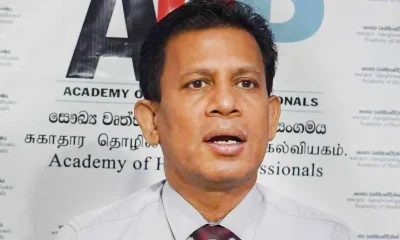
 News3 days ago
News3 days agoSuspension of Indian drug part of cover-up by NMRA: Academy of Health Professionals


